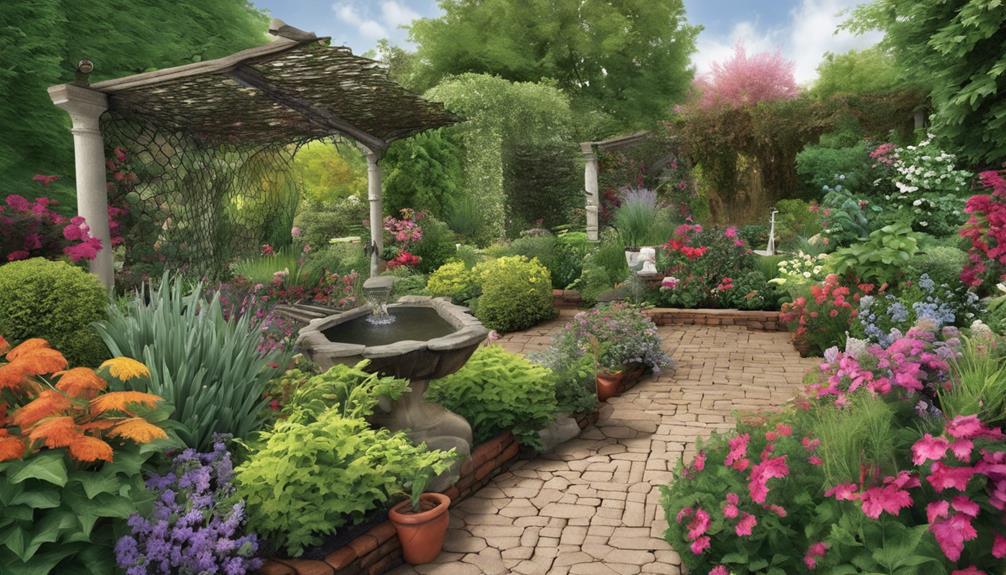When it comes to protecting our outdoor garden from insects, it is crucial to recognize common pests such as aphids, spider mites, whiteflies, caterpillars, and slugs. Utilizing natural remedies like neem oil spray and practicing prevention methods such as companion planting with marigolds and basil can deter pests. Integrated pest management strategies emphasize organic pesticides, beneficial insects, and routine plant checks to maintain a healthy garden. Installing barriers like insect netting and planting pest-repelling herbs will help safeguard our outdoor plants.
Explore more on how to protect your plants from bugs by incorporating these techniques.
Key Takeaways
- Use insect netting and screens to create physical barriers against pests like aphids and whiteflies.
- Companion plant with pest-repelling herbs like basil and mint for natural insect deterrence.
- Introduce predatory insects such as ladybugs and lacewings to keep pest populations in check.
- Conduct regular plant inspections to detect pest issues early on.
- Have backup treatments like beneficial nematodes and neem oil ready for specific pest control needs.
Identifying Common Outdoor Garden Pests
When we survey our outdoor gardens for potential threats, it's crucial to recognize the common pests that can wreak havoc on our plants. Some of these pests include aphids, spider mites, whiteflies, caterpillars, and slugs.
Aphids are small insects that reproduce quickly and feed on plant sap, while spider mites, although tiny, can cause significant damage by sucking plant fluids and creating webbing. Caterpillars can also pose a threat by devouring leaves and flowers, leading to severe damage if not controlled.
To combat these pests, a natural and effective solution is using neem oil spray. Neem oil is derived from the seeds of the neem tree and acts as a potent insect repellent. It's safe for plants, including cannabis, and helps in controlling a wide range of bugs without harming beneficial insects. Regularly spraying neem oil on outdoor plants can provide an efficient natural control method for these pesky intruders.
Implementing Effective Prevention Strategies

To strengthen the defense against garden pests, incorporating proactive prevention strategies is essential in safeguarding the health and well-being of outdoor plants. Utilizing companion plants such as marigolds, basil, and onions can naturally deter pests and promote a healthy growing environment.
Installing insect netting and screens provides physical protection from pests while still allowing essential sunlight and airflow to reach the plants. Introducing beneficial insects like ladybugs and lacewings serves as a natural and eco-friendly method to control harmful pests in your outdoor grow.
Regularly inspecting plants for early pest detection and maintaining a balanced ecosystem are essential preventive measures to ensure ideal growth. In case of infestation, having backup treatments like beneficial nematodes, neem oil, and Bacillus thuringiensis on hand can offer targeted pest control solutions.
Integrated Pest Management Techniques
Integrated Pest Management Techniques encompass a variety of strategies aimed at effectively controlling pests while maintaining a healthy and sustainable outdoor growing environment.
In outdoor grows, where cannabis plants are vulnerable to various pest species, utilizing organic pesticides like neem oil can be a key component of integrated pest management. This approach emphasizes the use of natural predators, companion planting, and resistant plant varieties to manage pest problems without relying solely on harmful chemicals.
By incorporating biological control methods and habitat manipulation, integrated pest management minimizes the need for traditional pesticides. This strategy not only reduces the risks to both people and the environment but also promotes sustainable pest control practices.
When implementing integrated pest management techniques, it's essential to monitor pest populations carefully and only resort to pesticides when absolutely necessary, ensuring a balanced and effective approach to pest control in outdoor cultivation.
Outdoor Grow Pest Control Methods

Utilize pest-repelling herbs like basil, garlic, and mint through companion planting to naturally deter bugs in your outdoor grow. In addition to companion planting, here are some effective pest control methods for outdoor grows:
- Introduce Beneficial Insects: Invite nature's pest control squad – ladybugs, lacewings, and predatory mites – to keep pest populations in check without harming your plants.
- Implement Physical Barriers: Use insect netting and screens to create a protective barrier around your plants, keeping pests out while still allowing essential airflow for healthy growth.
- Conduct Regular Plant Inspections: Stay vigilant by inspecting your plants frequently. Early detection of pests allows for swift action to prevent infestations from taking hold.
For targeted pest control in outdoor grows, consider employing backup treatments like beneficial nematodes, neem oil, and Bacillus thuringiensis. By combining these methods and staying proactive with your pest prevention strategies, you can safeguard your outdoor plants and promote a thriving garden environment.
Safeguarding Your Outdoor Plants

After addressing methods for pest control in outdoor grows, ensuring the safeguarding of your outdoor plants becomes essential to maintaining a healthy and thriving garden environment.
To safeguard your outdoor plants effectively, consider using a combination of strategies. Implementing insect netting and screens can act as vital barriers against common pests like aphids and whiteflies. Additionally, companion planting with pest-repelling herbs such as basil and mint not only adds diversity to your garden but also helps deter insects naturally.
Introducing predatory insects, such as ladybugs and lacewings, preemptively can also help maintain a balanced ecosystem and control pest populations. Regular plant inspections are critical to catch any pest issues early on.
Have backup treatments like beneficial nematodes, neem oil, and Bacillus thuringiensis ready for specific pest control needs in your outdoor grows. By combining these methods and staying vigilant with plant care, you can create a robust defense system for your outdoor plants.
Frequently Asked Questions
How Do I Get Rid of Bugs on My Outdoor Plants?
To get rid of bugs on our outdoor plants, we regularly inspect for damage, use natural repellents like neem oil or garlic spray, introduce beneficial insects, set up physical barriers, and maintain good garden hygiene.
How Do I Keep Bugs From Eating My Plants Naturally?
We keep bugs from eating our plants naturally by planting companion herbs like basil and mint. These natural pest-repellents create a balanced ecosystem in our garden, ensuring our plants thrive without the need for harmful chemicals.
How Do I Keep Bugs Out of My Grow Tent?
To keep bugs out of our grow tent, we use insect netting, proper ventilation, and regular plant inspections. We also maintain cleanliness and consider natural bug repellents like neem oil or garlic spray to deter pests effectively.
How Do I Get Rid of Bugs in My Vegetable Garden Soil?
When dealing with bugs in our vegetable garden soil, we tackle them head-on. We employ beneficial nematodes, introduce predatory insects, rotate crops, apply diatomaceous earth, and utilize compost tea to maintain healthy soil and deter pests.
Can the Methods for Protecting Outdoor Grows From Bugs Be Applied to Crate Training a Puppy?
When it comes to crate training schedule for puppy, some methods used to protect outdoor grows from bugs can be applied. Utilizing natural deterrents like cedar chips, cleaning regularly, and implementing barriers, such as screens, can help keep bugs away from both outdoor plants and a puppy’s crate.
Conclusion
In summary, safeguarding your outdoor grow from bugs is essential for a thriving garden. By following our all-encompassing manual, you'll be equipped with the knowledge and tools necessary to repel those pesky pests.
With our proven methods, your plants will be protected from harm and thriving in no time. So go forth, courageous gardener, and conquer those bugs with confidence! Your garden will appreciate it.








